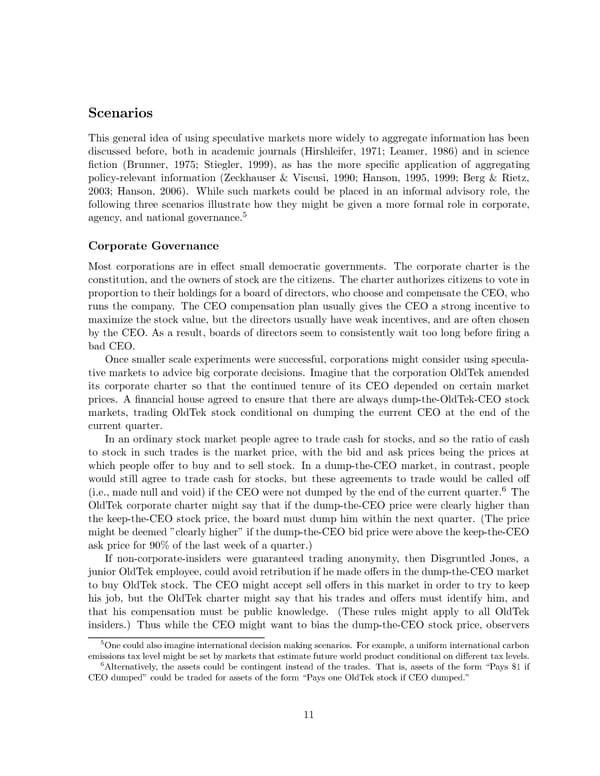Scenarios This general idea of using speculative markets more widely to aggregate information has been discussed before, both in academic journals (Hirshleifer, 1971; Leamer, 1986) and in science fiction (Brunner, 1975; Stiegler, 1999), as has the more specific application of aggregating policy-relevant information (Zeckhauser & Viscusi, 1990; Hanson, 1995, 1999; Berg & Rietz, 2003; Hanson, 2006). While such markets could be placed in an informal advisory role, the following three scenarios illustrate how they might be given a more formal role in corporate, agency, and national governance.5 Corporate Governance Most corporations are in effect small democratic governments. The corporate charter is the constitution, and the owners of stock are the citizens. The charter authorizes citizens to vote in proportion to their holdings for a board of directors, who choose and compensate the CEO, who runs the company. The CEO compensation plan usually gives the CEO a strong incentive to maximize the stock value, but the directors usually have weak incentives, and are often chosen by the CEO. As a result, boards of directors seem to consistently wait too long before firing a bad CEO. Once smaller scale experiments were successful, corporations might consider using specula- tive markets to advice big corporate decisions. Imagine that the corporation OldTek amended its corporate charter so that the continued tenure of its CEO depended on certain market prices. A financial house agreed to ensure that there are always dump-the-OldTek-CEO stock markets, trading OldTek stock conditional on dumping the current CEO at the end of the current quarter. In an ordinary stock market people agree to trade cash for stocks, and so the ratio of cash to stock in such trades is the market price, with the bid and ask prices being the prices at which people offer to buy and to sell stock. In a dump-the-CEO market, in contrast, people would still agree to trade cash for stocks, but these agreements to trade would be called off (i.e., made null and void) if the CEO were not dumped by the end of the current quarter.6 The OldTek corporate charter might say that if the dump-the-CEO price were clearly higher than the keep-the-CEO stock price, the board must dump him within the next quarter. (The price mightbe deemed ”clearly higher” if the dump-the-CEO bid price were above the keep-the-CEO ask price for 90% of the last week of a quarter.) If non-corporate-insiders were guaranteed trading anonymity, then Disgruntled Jones, a junior OldTek employee, could avoid retribution if he made offers in the dump-the-CEO market to buy OldTek stock. The CEO might accept sell offers in this market in order to try to keep his job, but the OldTek charter might say that his trades and offers must identify him, and that his compensation must be public knowledge. (These rules might apply to all OldTek insiders.) Thus while the CEO might want to bias the dump-the-CEO stock price, observers 5One could also imagine international decision making scenarios. For example, a uniform international carbon emissions tax level might be set by markets that estimate future world product conditional on different tax levels. 6Alternatively, the assets could be contingent instead of the trades. That is, assets of the form “Pays $1 if CEOdumped” could be traded for assets of the form “Pays one OldTek stock if CEO dumped.” 11
 Shall We Vote on Values, But Bet on Beliefs? Page 12 Page 14
Shall We Vote on Values, But Bet on Beliefs? Page 12 Page 14